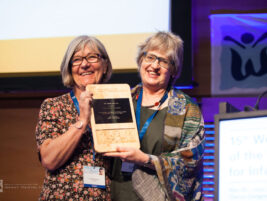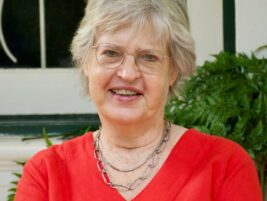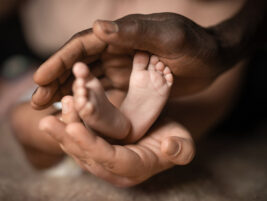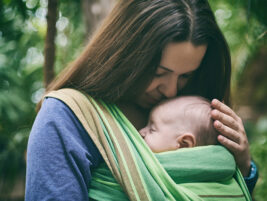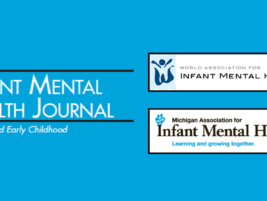Deep down in every heart Lies things long forgot Each of us a babe in arm Each of us once wrapped in someone’s arms. Such sweet memories (Poem by Midori Kumon)
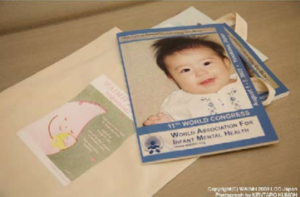
At long last, sweltering summer days have passed, and a serene cool autumn has set in Yokohama. It is now a time of reflection for the Local Organizing Committee (LOC). More than 2000 participants from 43 countries gathered in Yokohama for the 2008 WAIMH congress. Fireworks adorned the Yokohama sky on August 1st, celebrating the eve of Yokohama Port’s 150th Anniversary and the first WAIMH world congress ever to be held in Asia. We celebrated record number of plenary and masters lecture speakers in this congress along with over 500 innovative presentations, thanks to the Program Committee. The ensuing five days left us enriched with vibrant, warm encounters among colleagues and friends old and new.
The experience of this year’s WAIMH congress convinced us that in spite of manifold differences we can unite by celebrating the baby of all ages; the real baby and the baby within us. Thus Akachan ni Kanpai ! Celebrating the Baby: Baby, Family, Culture heralded an era of new infant mental health, where babies and families are cherished and respected as the precious roots of our lives.
A place for everyone
From the outset, we had dreamed of creating at the Yokohama 2008 WAIMH Congress a place for everyone. Members of NGO Mind Club, a community-based confectionary factory for young people with mental disorders, busied themselves in making 4,000 packets of cookies out of their oven to be served at coffee breaks during the five-day congress. Among experts in infant mental health were many youngsters, patients of mine and my colleagues’ (some were former NICU babies), volunteering to welcome participants from all over the world. Undoubtedly, young adolescent volunteers, most of whom were suffering from hikikomori(social withdrawal), school refusals and eating disorders, who often felt alienated in the community revived their self-esteem through actively dedicating and engaging themselves as volunteers during the congress, assisting with interpretations in cultural programs or directing participants to the right lecture rooms. Our 2008 WAIMH congress logo and above poem were designed by a young woman, Midori Kumon, who overcame her adolescent crisis and transformed herself through abundant rampant re-amae experiences with her mother. How enlivened has she felt to be included in the processes leading up to and during the 2008 WAIMH congress!
A decade-long awareness building across Japan The road to the Yokohama congress was long and steady. In 1992, when the current WAIMH was born out of merger of the WAIPAD and the IAIMH in the 5th Chicago World Congress, no one in Japan in the field of infant health knew about WAIMH. When in 1994, we held a regional WAIMH meeting in Tokyo, it was a meeting exclusively for psychiatrists, child psychiatrists and psychologists mostly in academic fields, and almost no clinicians were included. It was only when Prof. Bertrand Cramer’s made his post-congress lecture tour on parent-infant therapy in Kochi, Japan that a passion for learning was ignited in Kochi community, which was soon supported by its regional government. In 1995 the Mayor of Kochi visited Prof. Cramer’s Infant Mental Health Clinic in Geneva on the occasion of his invited speech to the WHO. In 1996, I urged hesitating pediatricians and community workers to attend the Tampere WAIMH Congresses; “Come and feel the atmosphere! It is a congress about infants and infants won’t need any verbal language.” To their surprise, they immediately felt the air in the Tampere Congress Hall as warm, genuine, serious, dedicated and caring. They became convinced that this was the forum, which they wanted to be connected with in the coming years. They wanted to act right away. They made a trip to a Santa Clause Village in Robaniemi in the Polar Region and found a colourful traditional hat that a reindeer shepherd wore. It was called FOUR WINDS hat, denoting north, south, east and west winds to guide their direction in snow-clad fields in winter.
After the Tampere Congress, these Japanese workers formed a group, named FOUR WINDS for Infant Mental Health, and an annual agenda was set to host a congress in regional areas of Japan and to invite a foreign lecturer each year to an open forum of encounter for all those who work for infants and families. With each FOUR WINDS conference, we accumulated skill and wisdom in hosting a friendly forum free from hierarchy and authoritative air. Later this FOUR WINDS became an acronym for the Forum of Universal Research for the Workings of Infant and Neonatal Developmental Support. Thus starting with Kochi in 1997, Nagasaki, Iwate, Yamanashi, Higashi Murayama, Tokyo, Toyama, Sasebo, Miyazaki, Hamamatsu and Tochigi became hosting cities and Dr. John Richer, Ms. Juliet Hopkins, Dr. Alan Sluckin, Prof. Colwyn Trevarthen, Prof. Justin Call, Ms. Mary Gordon, Dr. Campbell Paul, Dr. Bertrand Cramer, Dr. Stephen Malloch, Prof. Tuula Tamminen and Prof. Franz Plooij became lectures and facilitated an incentive for learning in each of these regions in Japan. Each hosting local group was composed of local administrative staff, community health worker, social workers, child psychiatrists, psychiatrists, pediatricians, social workers and other professionals, and became a secure base for community infant mental health activities.
Openness and honesty as foundation for our WAIMH congress preparation
To celebrate the baby in its true meaning, particularly in Japan, we strove to create openness and seek honesty within ourselves. So, from the beginning, we said “no” to hierarchical authoritative orientation, often linked to social events in Japan. We instead said “yes” to all those who were willing to lend their hands. The number and diversity of volunteers were unprecedented. We invited friends and colleagues motivated to create a welcoming ambience for genuine encounters without hierarchy. There is a deep handicapping divide in Japan between those with and without command of the English language. For ordinary non-English speaking Japanese workers, an international congress felt irrelevant or intimidating. I wanted to resolve this unfortunate divide by inviting non-English speaking members to work closely with me. To mitigate vulnerabilities of this formation, the core group in the LOC was constantly monitored by a group of experienced senior academicians on the one hand and a group of young vibrant bilingual professionals abroad and in Japan. The former willingly gave us wise opinions and support from international perspectives, while the latter openly alerted us to the here and now of risky situations. The Japanese LOC worked hard to promote the 2008 congress and to encourage a large number of congress participation from various parts of Japan. Site visits by Tuula Tamminen and Neil Boris in 2006 and Kaija Puura and Hiram Fitzgerald in 2007 provided the LOC direct support by the WAIMH office, which was an enormous relief and encouragement.
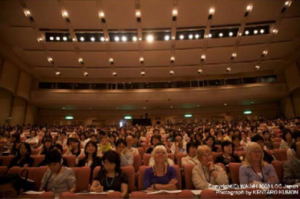 Beyond the success of the 2008 congress itself, I feel it was a great success that I was able to encourage reluctant and timid Japanese colleagues to go beyond their comfort zone and to promote their individual and professional growth. Inevitably, throughout the organizing process we made and learned from many mistakes. We argued, made and undid decisions and went over everything again and again. Despite challenging moments, such honest endeavors made us more open, wiser and optimistic. Many reported it was a wonderfully enriching and exciting learning experience.
Beyond the success of the 2008 congress itself, I feel it was a great success that I was able to encourage reluctant and timid Japanese colleagues to go beyond their comfort zone and to promote their individual and professional growth. Inevitably, throughout the organizing process we made and learned from many mistakes. We argued, made and undid decisions and went over everything again and again. Despite challenging moments, such honest endeavors made us more open, wiser and optimistic. Many reported it was a wonderfully enriching and exciting learning experience.
Across Japan, the eleven leaders of the FOUR WINDS already had a first-hand experience of organizing an infant congress in their areas of about 200 to 1000 participants. Their morale was high after a decade of awareness building and grass-roots efforts for the importance of infant mental health and building communities that naturally support families with young children. With a mutually trusting comradeship, they acted as substantial supporters in their mature, silent, and humble ways. They set the tone of cultural dignities and pride of their regions and added flavors of welcome to the foreign attendants of the congress. In the local Yokohama area, my home ground, friends and colleagues new and old gathered together; in all, more than 300 volunteers took part in various ways for the congress. Relationships were built and strengthened not only among professionals in infant mental health but with anyone and everyone who wanted to help in promoting the 2008 congress.
Celebrating the baby of all ages and ‘Amae’
The theme of our congress was celebrating the baby of all ages. Using the late Serge Lebovici’s trilogy of the real, imaginary and fantasmatic baby, we wanted to celebrate the real baby in life, but also the imaginary baby. This meant fulfilling our wish that every baby would live its moments in good enough contexts. We also aimed to focus at the same time on redeeming the fantasmatic baby, within and without, which meant reflecting on the unresolved trauma and conflicts of wartime and post-war relationship problems, which is silently ubiquitous in Japan and yielding all sorts of individual, familial and societal deviations and mental problems in the next generations.
During my plenary speech, I invited Naohiko Umewaka, a renowned Noh actor and contemporary play writer, to present his silent play the “Birthday Cake” shot on 4K digital cinema cameras in collaboration with the Institute of Digital Media Contents of Keio University. I did this because I understand his work to be very much in touch with the fantasmatic world of the baby (and the baby of all ages) and the deep bond of early days with mother nature and culture. Umewaka’s multi-faceted and beautiful vision depicts a soul desperately striving to hold on to its inner resources of parental love and sense of self and dignity in moments of ultimate alienation.
Intricately relevant to the vision in the film is the concept of ‘Amae,’ studied by a renowned Japanese psychoanalyst, Takeo Doi and reevaluated in this congress. Amae derives from a Japanese adjective, sweet, and describes mutual relational experiences synonymous with companionship and synrhythmia. ‘Amae’ embraces a deep mutual trust shared among a group, which sustains vulnerable individuals at time of extreme difficulty. Through Umewaka’s film, I wished to bring us in touch with the core essence of infant mental health work. We need sympathy in order to be in touch with the deepest pain in the lived moments of babies, children and young people living in impossible contexts and fate (such as fatal diseases, abandonment, abuse, loss and exploitation). Personally, my mission and deep resonance emerged from my elder sister, who died at the age of 10 months from malnutrition just before the end of World War II, and from knowing of young men, who died tragic and inhumane deaths in the war fields. Imprisoned by their time and systems of their environment, how could these individuals, young and old, have silently maintained dignity as a person with his or her own right in the throes of such bleak human aggression? Umewaka’s “Birthday Cake” is an experience worthy of repeated encounters, each time allowing new insights and emotions to emerge. As anticipated, Umewaka’s film stirred diverse responses, which I hope will be foods for thought and reflections for years to come.
Asian Panel at the 2008 WAIMH congress
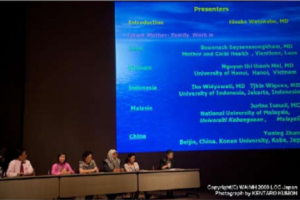 We wanted to mark the first WAIMH congress in Asia by hosting an Asian Panel presentation with representatives from various Asian regions. Planning for the Asian Panel for the WAIMH congress was difficult. We had hoped and tried to bring experts especially from regions in Asia that had fewest resources, and encountered challenges unforeseen. We were thrilled in the end to welcome Dr. Bounnack from Laos and Dr. Nguyen from Vietnam, who confided to us this was their first trip ever abroad. We are grateful for their participation. I must also thank our wonderful colleagues from Indonesia, Malaysia, and China for their help and contribution to the Asian Panel discussion. In addition to learning about the current plight of young children and families in various Asian regions, the Asian panel provided for me a reminder that there is much task ahead for WAIMH, particularly in supporting young children in developing countries. It is my hope that we will continue to foster new relationships with our Asian colleagues and to provide support in their work with infants and families.
We wanted to mark the first WAIMH congress in Asia by hosting an Asian Panel presentation with representatives from various Asian regions. Planning for the Asian Panel for the WAIMH congress was difficult. We had hoped and tried to bring experts especially from regions in Asia that had fewest resources, and encountered challenges unforeseen. We were thrilled in the end to welcome Dr. Bounnack from Laos and Dr. Nguyen from Vietnam, who confided to us this was their first trip ever abroad. We are grateful for their participation. I must also thank our wonderful colleagues from Indonesia, Malaysia, and China for their help and contribution to the Asian Panel discussion. In addition to learning about the current plight of young children and families in various Asian regions, the Asian panel provided for me a reminder that there is much task ahead for WAIMH, particularly in supporting young children in developing countries. It is my hope that we will continue to foster new relationships with our Asian colleagues and to provide support in their work with infants and families.
Media coverage and nationwide interest
Tremendous efforts were made to advertise the 2008 WAIMH congress, leading to the record number of participants in WAIMH’s history. The congress also received some media coverage within Japan. The Pre-congress Symposium II entitled, ‘Early Intervention of Infant Abuse’ by Colwyn Trevarthen and Bertrand Cramer as speakers and Kaija Puura as discussant was later compiled into a one-hour TV program by Japan’s national broadcasting company the NHK (Japan Broadcasting Corporation). Approximately 400,000 viewers were said to have watched the program on Sunday evening of September 7th, 2008. During the congress, press conferences were held, and an exclusive interview with Tuula Tamminen on the 2008 WAIMH congress ended up in Yomiuri Shinbun, the most widely read newspaper in Japan, on August 9th.
Learning from the small, simple beings
Vulnerable infants are the canaries of our society. Their life depends on sincere around-the-clock attendance of caregivers. They provide us with such rich learning experiences. I wanted to place them at the very center of my heart and the congress. Like a flower, a seed was planted 12 years ago in Tampere, Finland. Its small sprout has been carefully nurtured with silent but sincere efforts of each FOUR WINDS congress and accumulated over the past ten years.
With the 2008 WAIMH congress now finished, I am filled with a sense of satisfaction from our great success. Tuula Tamminen impressed me in one of her speeches, where she said she felt fine because she knew now that she had done something good for babies and families. I hope for each person attending the congress whether as a participant, a presenter, or a volunteer, the time spent in the WAIMH congress was rewarding. It has been my policy over 35 years of my clinical work to facilitate mutual trust and interaction with children and families so that they can honestly confide to me their agenda without undue Japanese formalities. From the beginning, I had stated that the aim of this congress was not to compete, perform or judge, but instead to be open and honest in sharing experiences. As I had hoped, I had the pleasure of witnessing many relationships built and collaborative spirits cultivated through the process of congress preparation and during the 5-day congress in Yokohama. Whispered Midori (author of the poem above) to me recently, “In your opening speech you said you aimed to create this forum to be where every single person can find his or her place, feel secure and be him or herself. Well it happened everywhere, as far as I know in the Pacifico and that was the most wonderful thing of the congress.” What better compliments could I expect? It is voices like hers and countless others in our society we need to listen to. I am grateful for all those from our communities, ordinary mothers, fathers, and childcare workers, who have shared their stories of their life experiences that reflect the circumstances of our current society. The experience of organizing the 2008 WAIMH Congress has become a memorable gift for each of us at the Local Organizing Committee, who toiled day and night for almost 2 and a half years. I am deeply grateful to all those who lent their heart, brain and hands: in particular, Tuula Tamminen, Hiram Fitzgerald, the WAIMH board members and the WAIMH Main Office, our LOC members, sponsors and hundreds of volunteers for contributing to this warmth and openness throughout the congress. I hope that the wonderful spirit and the momentum we have created through 2008 WAIMH congress will be carried forward, and I look forward to meeting my friends and colleagues again in Leipzig, Germany.
“Akachan ni Kanpai!” Celebrating the Baby: Baby, Family, Culture
Authors
Watanabe, Hisako, M.D., Ph.D.,
WAIMH Local Chair,
Japan



